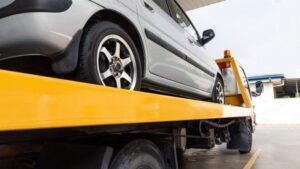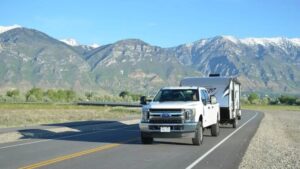Tips For Long Road Trip to Avoid a Tow – Planning a long road trip can be one of the most exciting experiences, but it also presents some challenges. One of the most serious concerns for any traveler is the possibility of vehicle trouble, which could result in a tow. To ensure a smooth and enjoyable journey, take proactive steps to avoid breakdowns and unnecessary delays. In this blog, we will share seven practical tips for preparing your vehicle and staying safe on the road. From routine maintenance checks to emergency supplies, these tips will help you navigate a long road trip with confidence and peace of mind. Whether you’re going on a family vacation or a solo trip, following these tips will help you reduce the likelihood of a tow and make the most of your travel experience.
7 Tips For Long Road Trip to Avoid a Tow
1. Conduct a Pre-Trip Vehicle Inspection
Before embarking on a long road trip, a thorough vehicle inspection is required. Begin by checking your engine oil, coolant, and brake fluid. These fluids are essential for your vehicle’s performance and can help prevent overheating and mechanical failures. In addition, check your tires for proper inflation and tread depth, as underinflated or worn tires can cause blowouts. Remember to check your battery for corrosion and make sure it’s charged properly. If your battery is older than three years, consider having it tested by a professional. Regular maintenance tasks, such as replacing air filters, inspecting belts and hoses for wear, and ensuring that your windshield wipers work properly, can significantly improve your vehicle’s reliability. A well-maintained vehicle is less likely to have problems, lowering the chances of requiring a tow.
Also Read:- Essential Tips For Safe Towing
2. Plan Your Route and Stay Informed
Planning your route ahead of time can help you avoid unnecessary detours and potential hazards. Use a dependable GPS or a mapping app to plot the most efficient route to your destination. Look for rest stops, gas stations, and repair shops along the way to avoid becoming stranded in remote areas. Also, be aware of weather conditions and road closures that may affect your travel. Checking for traffic updates and potential hazards before heading out can help you avoid congested roads and accidents. Consider downloading offline maps in case you lose internet connection during your trip. A well-planned route not only saves time, but also provides peace of mind by ensuring that you have access to resources if problems arise while traveling.
3. Pack an Emergency Kit
An emergency kit is essential for any long road trip, as it can make a big difference in resolving unexpected problems. Begin by stocking a first-aid kit with necessary supplies such as bandages, antiseptic wipes, and pain relievers. A flashlight with extra batteries is essential for nighttime emergencies, and jumper cables can help you restart a dead battery. You should also bring some basic tools, such as a wrench and a screwdriver, to handle minor repairs. Non-perishable snacks and bottled water will keep you energized and hydrated in the event of a delay. For added comfort, consider packing a blanket and a spare phone charger. An emergency kit ensures that you are prepared for the unexpected, allowing you to avoid a tow and get back on the road quickly.
4. Stay Hydrated and Take Breaks
Long road trips can be exhausting, leading to poor decisions and accidents. Staying hydrated and taking frequent breaks are essential for maintaining focus and energy. Take breaks every two hours or so to stretch your legs, use the restroom, and get a snack or drink. These breaks help to avoid stiffness and fatigue, keeping you alert and focused on the road. Drinking water is essential for staying hydrated, so keep a cooler full of beverages nearby. Avoid excessive caffeine and sugary beverages, which can cause energy crashes. If you’re traveling with passengers, consider rotating driving responsibilities to share the load. Prioritizing hydration and breaks improves your safety and reduces the likelihood of requiring assistance due to fatigue-related issues.
5. Know Your Vehicle’s Limits
Understanding your vehicle’s limitations is critical for a successful long-distance trip. Each vehicle has unique specifications for weight capacity, towing capacity, and fuel efficiency. Before you begin packing your belongings, familiarize yourself with these details. Overloading your vehicle can result in poor handling and increased wear on the tires and suspension. Make sure your cargo is evenly distributed to maintain stability while driving. Consider your vehicle’s fuel range, especially when traveling through remote areas with few gas stations. Knowing when and where to refuel can help you avoid unexpected delays and running out of gas in the middle of nowhere. Respecting your vehicle’s limits reduces the possibility of mechanical failure and ensures a smoother journey.
6. Keep Your Phone Charged and Accessible
In today’s world, your smartphone can literally save your life on the road. Before you begin your journey, make sure your phone is fully charged and has essential apps for navigation, weather updates, and roadside assistance. Consider purchasing a car charger to keep your phone charged throughout the journey. If you encounter traffic or road closures, a dependable navigation app can assist you in rerouting your trip. In addition, downloading offline maps is a good idea in case you lose cell service in remote areas. Store important contact information, such as your roadside assistance provider and family members, for easy access in an emergency. Keeping your phone charged and accessible can increase your safety and allow you to address issues quickly if they arise during your trip.
Also Read:- Towing Tools Every Driver Should Know About
7. Invest in Roadside Assistance
Having a roadside assistance plan can give you peace of mind on long road trips. These services provide assistance in a variety of situations, including flat tires, dead batteries, fuel delivery, and towing if necessary. Research various roadside assistance programs to find one that meets your needs, whether through your insurance company or an independent service. Many programs provide 24/7 support, ensuring that you can get help at any time. Familiarize yourself with the service’s procedures so you know what to do in an emergency. Investing in roadside assistance not only relieves the stress of vehicle issues, but also serves as a safety net, allowing you to enjoy your trip with greater confidence.
Conclusion
By taking the time to prepare your vehicle and plan ahead, you can significantly reduce the risk of needing a tow during your long road trip. Regular maintenance checks, packing essential supplies, and staying aware of your surroundings are key to a smooth journey. Remember, the open road is meant to be enjoyed, so embrace the adventure with confidence. With these tips in mind, you’ll be well-equipped to handle any challenges that may arise and focus on creating lasting memories on your travels.
FAQs
What are the essential checks to perform before a long road trip?
Before hitting the road, check your tire pressure, fluid levels (oil, coolant, and brake fluid), brakes, and battery. Ensure your lights and wipers are functioning properly and that your spare tire is in good condition.
What emergency supplies should I pack for a road trip?
Essential emergency supplies include a first aid kit, flashlight, jumper cables, basic tools, non-perishable snacks, water, and a blanket. It’s also wise to have a roadside assistance kit in case of unexpected issues.



